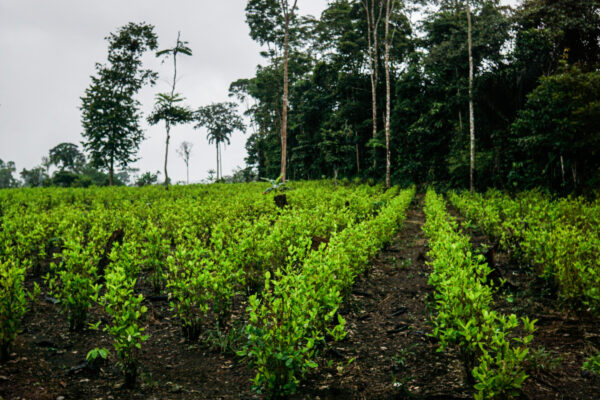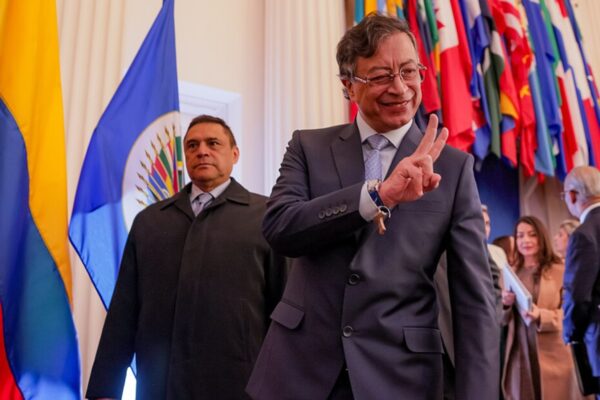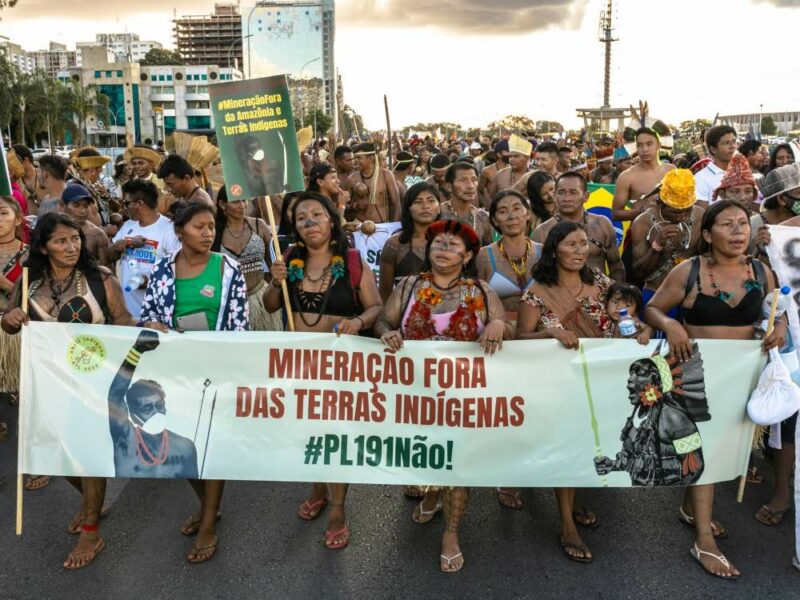Amid the bustle of the COP16 biodiversity summit held over the past two weeks in Cali, Colombia, a powerful chorus of voices emerged in the global struggle to prevent the Amazon rainforest from reaching its ecological tipping point of no return.
A dynamic coalition of legislators from Amazonian countries – including several Indigenous congresswomen from Brazil and Ecuador – are joining forces as Parliamentarians for a Fossil-Free Future to demand a fossil-free Amazon.
Indigenous and traditional Amazonian communities have been on the front lines of resistance against oil companies encroaching upon their ancestral territories for decades. For 28 years, Amazon Watch has stood in solidarity with Indigenous peoples such as the U’wa people in Colombia, the Kichwa people of Sarayaku in Ecuador, and the Achuar people in Peru, whose struggles have kept oil operations out of large swaths of the rainforest. Yet, U.S. climate policies under an incoming Trump administration are poised to embolden existing plans led by Amazonian countries to expand oil drilling in the rainforest, making the Indigenous-led fight to protect their communities and this vital ecosystem from extractivism as crucial as ever.

Can you chip in $10 to help protect Indigenous Earth Defenders?
Donations from supporters like you are what have allowed us to keep doing this important work for over 28 years.
The recent emergence of the coalition – and the launch of their Global Parliamentary Inquiry for a Fossil-Fuel Free Amazon – adds a powerful and novel platform for Indigenous and traditional communities to amplify their visions for a just transition on a global scale. This partnership between communities, the parliamentarians, and civil society allies was on full display throughout COP16, serving as a beacon of hope for our collective struggle for environmental and climate justice.
Indigenous leadership front and center at COP16
The powerful testimonies of Indigenous leaders across the Amazon reverberated throughout the Colombia Pavilion as community and political leaders – such as the Colombian congressman Andrés Cancimance from the Amazonian department of Putumayo – gathered at Amazon Watch’s Amazon Free Extractive Industries event in the official negotiation space, the Blue Zone. Motivated by their deep commitment to protect their communities and traditional ways of life, Inga, Achuar, and Waorani Indigenous leaders shared their first-hand experiences of the catastrophic destruction wrought over decades of oil extraction in their ancestral homelands.
While transition minerals are lauded as a solution to the climate crisis being driven by the extractive fossil fuel industry, Representative Cancimance and Brazilian Indigenous leader Kleber Karipuna warned that the mining industry poses imminent threats to global biodiversity and Indigenous communities, too.
Mining operations are a key contributor to Amazon deforestation, facilitating the destruction of the epicenter of biodiversity in the name of a global energy transition. Their struggles against the new wave of mining projects in Brazil and across the Amazon underscore the cruciality of declaring the Amazon as both a no-go zone for oil drilling and mining in order to safeguard this critical biome and its greatest guardians.

As COP16 progressed, Indigenous and grassroots leaders from across the vast Amazonian region continued to share the stage with regional legislators, contributing their invaluable frontline knowledge to this initial phase of the investigation on a just transition in the world’s largest rainforest.
Olivia Bisa, first female president of the Chapra Nation in the Peruvian Amazon, exposed the compounded harms Indigenous women are facing at a packed public hearing on the impacts of the oil and gas industry led by the parliamentarians.
“The North Peruvian Pipeline has generated invasions of colonists, prostitution and alcoholism, which means the perpetual violation of Indigenous women. With alcoholism we are the most impacted because we are attacked physically, sexually, and psychologically. Given this we say no more oil in our territory,” she declared.
Olivia – like many Indigenous women across the Amazon – is living and resisting on the front lines of both the extractive fossil fuel industry and gender-based violence. Despite facing formidable threats to her safety, she continues to organize to protect her ancestral territory, underscoring the indispensability of Indigenous women’s leadership to the fight to phase-out fossil fuels in the Amazon and globally.
At the end of her powerful presentation, Olivia officially submitted the new report “Peru’s Oil Circuit and Human Rights” to the parliamentarians present, as informational yet important input into the Amazon Inquiry.

Recognizing the existential threats Earth defenders are navigating in key Amazonian countries such as Colombia and Brazil, several of the parliamentarians collaborated with Amazon Watch and Global Witness to host a public forum uplifting the testimonies of Indigenous leaders.
Jani Silva from Colombia’s Amazon Pearl region denounced the death threats she and others in her organization have received over the years from criminal armed groups that operate in the interests of oil companies in the region.
“The threats we confront as an organization that defends our territory and environmental rights are due to the denunciations we make against pollution and exploitation in our territory. We can’t deny the evident complicity between armed groups and oil companies, through the company’s sub-contractors. The threats continue against peasant, Afro and Indigenous leaders that share the objective of defending their territory,” she pronounced.
Colombia is the most dangerous place in the world for environmental defenders, with a record of 79 murders of social and Indigenous leaders last year alone. The Colombian press largely attributes this violence to criminal organizations such as the Comandos de la Frontera, who, according to the claims of some Colombian human rights groups, collaborate with oil companies such as GeoPark and Grand Tierra.
As Indigenous communities, parliamentarians, and civil society continue to join forces to usher in a new era of climate justice in the Amazon, it is imperative that the protection of Earth defenders remain central to the coalition’s fossil fuel phase-out efforts.

The path forward to COP30
Over the next year, the parliamentarians will host a series of public hearings on various aspects of oil in the Amazon. As they compile their research in preparation for the historic COP30 in Brazil next year, Amazon Watch is committed to ensuring that frontline Indigenous solutions are front and center in this emerging alliance for a fossil free Amazon.
The Amazon and the Indigenous communities who defend it will face deepening threats from harmful U.S. climate policy advanced by the incoming Trump administration, burgeoning authoritarianism worldwide, and rampant corporate greed that prioritizes profit over people.
The coalition serves as a powerful reminder of our collective power to resist this impending assault to global environmental justice. Together, we can confront extractive industries and nurture a just and inclusive energy transition, guided by the wisdom of Indigenous communities who continue to protect the Amazon and our collective future.













